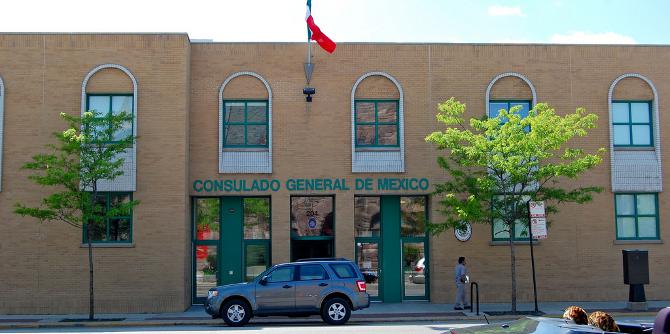 In discussions of President Obama’s controversial executive action on immigration last month, most commentators have focused on the role of the U.S. government. Alexandra Délano looks at the part that Mexico’s U.S. consulates will now play, writing that they will have to bear the brunt of providing advice and assistance to the millions of migrants in the U.S. that are potentially eligible for work authorization. She also argues that Obama’s newly announced measures, like his 2012 expansion of Deferred Action for Childhood Arrivals, will have a significant impact in migrants’ relationships to their home and host country. She writes that the gradual change in U.S. immigration policy will allow Mexico to explore new ways of engaging with migrants who have benefitted from these programs, and allow expatriates to better reconnect with their home country.
In discussions of President Obama’s controversial executive action on immigration last month, most commentators have focused on the role of the U.S. government. Alexandra Délano looks at the part that Mexico’s U.S. consulates will now play, writing that they will have to bear the brunt of providing advice and assistance to the millions of migrants in the U.S. that are potentially eligible for work authorization. She also argues that Obama’s newly announced measures, like his 2012 expansion of Deferred Action for Childhood Arrivals, will have a significant impact in migrants’ relationships to their home and host country. She writes that the gradual change in U.S. immigration policy will allow Mexico to explore new ways of engaging with migrants who have benefitted from these programs, and allow expatriates to better reconnect with their home country.
Obama’s recently announced administrative actions on immigration benefit an estimated 4 million undocumented migrants, the majority of them from Mexico. Republicans are already challenging the constitutionality of these measures, but the biggest test for the Obama administration will be to ensure that the majority of those eligible actually apply for the programs. Beyond domestic politics, the countries of origin of those benefitting from these programs have a significant role to play, and need resources and strategies in the short and long term to respond to the challenges and changes implied by programs that regularize (temporary or permanently) the status of millions of undocumented migrants.
The Mexican government has welcomed the new Deferred Action for Parental Accountability (DAPA) program, as well as the expansion of the Deferred Action for Childhood Arrivals (DACA), which eliminates the age limit for applicants that arrived in the US before turning 16. For Mexico, this is a key step forward in a decades-long diplomatic effort to promote legislation that will regularize the status of its population of about 6 million undocumented migrants in the United States. Even though Obama’s deferred action programs are temporary and limited measures, and will leave out all the immigrants who did not arrive before the age of 16 or do not have children who are either U.S. citizens or legal permanent residents, they have the potential of benefitting at least half of the Mexican population with irregular status. In the Mexican government’s words this will “increase their opportunities as well as help them live with greater dignity and certainty”.
The fact that these measures do not come with a budget (the costs incurred by the United States Citizenship and Immigration Services [USCIS] will be covered by the application fees), means that migrant-serving organizations, including foreign consulates, will bear the brunt of providing information and assistance. They will have to help immigrants find out if they are eligible for the deferred action programs, and if so, assist them in filling out applications, gathering the documentation required to prove their residence in the country for at least five years, and preventing fraud. As the vice consul of El Salvador in Washington D.C. recently stated: “it is going to be a documentation flood”.
The Mexican government and its network of 50 consulates in the United States have gained much experience in these types of efforts since the DACA program began in 2012. The consulates and the networks of partner institutions they have developed throughout the years, including lawyers, financial service agencies, labor rights agencies, health clinics, education programs, as well as coalitions with other Latin American consulates, have worked together to promote information campaigns, seminars and workshops to fill out applications as well as specialized legal counseling services. They have also helped immigrants prove their time of residence in the country or fulfill requirements such as the completion of a GED or high school to make them eligible for DACA. These campaigns are considered a key factor in the success of Mexican immigrants’ applications for DACA, compared with other countries. However, with the new deferred action programs, the number of potential applicants has now tripled and the consulates, as well as the advocacy groups, will face a huge challenge in meeting this demand once the application periods begin next February.

The results of DACA indicate that at least 40 percent of potential beneficiaries have not applied for this program due to lack of information, out of fear that sharing their personal information may lead to their deportation (either immediately or in the case that the program is cancelled), or because they cannot cover the cost of the application (US$465). Similar rates are expected for the new DAPA program, but with the added challenge of thinly stretched resources to provide assistance and information, and the fact that those eligible for DAPA haven’t necessarily been as actively involved in the debate as the so-called “DREAMers” eligible for DACA. The 1.5 generation eligible for DACA essentially grew up in the United States, attended school in the country, speaks English well, and in most cases is connected to a network of peers (online or in their community) that shares information about the programs. This will not be the case for many of the first generation adults eligible for DAPA, which means that fear and a lack of information will be a more significant barrier.
Both deferred action programs (DACA and DAPA) are subject to renewal in three years (under a different administration) and do not include access to any additional public benefits. Nevertheless, these measures will have a significant impact in migrants’ relationships to their home and host country in the short and long term. “Coming out of the shadows” without fear of being deported, will contribute to their closer interaction with U.S. institutions that can help improve their lives. First of all, having this temporary legal status can give them access to higher paying jobs. But beyond economic stability, it will also give them more security in applying for public benefits to which their children (U.S. citizens or Lawful Permanent Residents) have a right to; being more active in their children’s schools; utilizing preventive health services that are available to everyone regardless of their status; or participating more actively in civic life. This will constitute one more step in their process of integration in the United States.
At the same time, deferred action comes with the possibility of applying for advance parole permits that allow migrants to travel outside the United States. This possibility will allow many of them to reestablish or strengthen ties to their country of origin. Both issues – integration and increased contact with the country of origin- require a new policy approach from countries like Mexico, El Salvador, Ecuador, among others, that work intensely to build relationships with their communities abroad. The gradual change in U.S. immigration policies through these administrative measures has allowed Mexico to test new strategies to engage migrants who have benefitted from these programs. This was the case with a visit organized by the Mexican Ministry for Foreign Affairs and the Mexican Embassy in the US for DREAMers that benefitted from DACA to travel to Mexico and reconnect with a country that many of them only remember vaguely. However, this is only the beginning of a very necessary reconceptualization of the objectives and strategies of the origin countries’ policies of engagement with their population in the United States as their right to live and work in their country of residence is confirmed, their opportunities for upward mobility increase, and they become increasingly active participants in their communities.
Please read our comments policy before commenting.
Note: This article gives the views of the author, and not the position of U.S.App– American Politics and Policy, nor of the London School of Economics.
Shortened URL for this post: http://bit.ly/1yyojTW
_________________________________
About the author
 Alexandra Délano – The New School
Alexandra Délano – The New School
Alexandra Délano is Assistant Professor of Global Studies at the New School. She received her doctorate from the University of Oxford in International Relations. Her publications include Mexico and Its Diaspora in the United States: Policies of Emigration since 1848 (Cambridge University Press, 2011) and articles in Political Geography, Politics and Society, International Migration Review, Journal of Ethnic and Migration Studies, and Social Research.





I have been educated on both DACA and DAPA, albeit from a leaning perspective, as well as the benefits immigrants will receive as a result of the cooperation of consulates and governments.
The article referred to the immigrant’s point of view, which is very crucial to understanding the implications of immigration policy. However, there is absent signs of significant refutation. Though, in its entirety, it taught me a cadre of information.